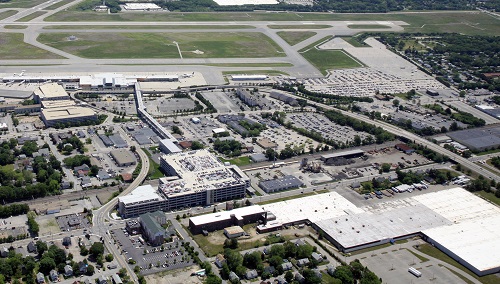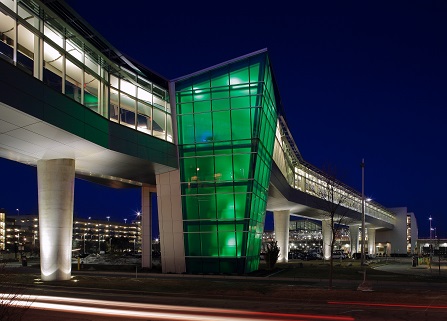WARWICK, R.I. — In true Rhode Island tradition, Iftikhar Ahmad wants T. F. Green Airport to be, like, you know, connected. In the eleven months since he took over as chief executive officer of the Rhode Island Airport Corporation, it has. With recent announcements by Norwegian, Frontier, Allegiant and OneJet airlines, T. F Green has nearly doubled, from 17 to 33, the number of cities its airlines fly to directly, adding destinations in Scotland, Ireland and Norway as well as Denver, New Orleans, Pittsburgh and Cincinnati. It’s part of a strategy the airport corporation hopes will position Green to bring in more revenue for itself as well as provide the state with a card to play when it looks to recruit new companies to the Ocean State. “It is an asset of Rhode Island,” Ahmad said. “We have a role to play.” Iftikhar Ahmad, president and CEO of the Rhode Island Airport Corporation, stands near an American Airlines jet at the T. F. Green airport. [The Providence Journal/Bob Breidenbach] Where the new ones go Norwegian Airlines: Cork, Dublin, Shannon in Ireland; Edinburgh in Scotland; Bergen in Norway Frontier Airlines: Denver, New Orleans, Miami, Raleigh/Durham Allegiant Air: St. Petersburg and Punta Gorda in Florida; Cincinnati OneJet: Pittsburgh When Ahmad arrived in October 2016, Green’s passenger counts had been stagnant at about 3.6 million annually for four years. Ahmad, who has worked at or run airports in Houston, Nashville, Dayton, and New Orleans, said his goals for T. F. Green were to increase the number of jobs there from around 2,400 to 4,000 and to boost the airport’s impact on the state economy — the money the visitors who pass through it spend here — from the currently estimated $2.6 billion a year to $4 billion. That effort kicked into gear in February, when Norwegian announced its non-stop flights to Norway, Scotland and Ireland, Green’s first year-round connection to the British Isles and continental Europe. In May, Frontier landed, with a long-coveted Providence-to-Denver route, as well as flights to New Orleans, Miami and Raleigh/Durham. The smaller Allegiant and OneJet came this summer. Ahmad said the next goal is more European connections and some to Central and South America. The new airlines fit with T.F. Green’s strategy to draw business from Boston’s Logan Airport by attracting bargain-hunting travelers. “In a 90-mile radius there are seven million people,” Ahmad said. “How do you take it from Logan and bring it here? By being cheaper than Logan.” A check last week of about 300 cars parked in a long-term parking lot showed 41 percent were from Rhode Island, 37 percent from Massachusetts and 16 percent from Connecticut. Michael Boyd, president of Boyd International, a Denver-based air industry consulting company, said in the past Green could use convenience to lure Logan travelers, because traffic congestion made it difficult to get in and out of Boston quickly. “Well, they fixed that,” with the highway relocations of the Big Dig, Boyd said. By adding flights to major hubs like Denver and Chicago, Boyd said Green can plug into international routes that enable travelers to get to Asia or Europe. When Green goes looking for a new airline, Ahmad said it wants two things: a destination no one else at Green flies to and low-cost fares. Before this year, just under half of the traffic at Green was with the low-cost Southwest Airlines. Frontier, Norwegian, OneJet and Allegiant are smaller but similar, looking to get people from one place to another at the lowest fare. Allegiant would never consider locating at Logan, said Dustin Hall, the airline’s manager at T. F. Green, because the cost of doing business there would blow its budget. Logan needs higher paying airlines, he said, and customers. It costs more for one day of parking at Logan — $53 — than the $38 Allegiant charges to fly from Providence to Cincinnati. Ahmad said airports can help cities, and their states, attract new businesses and keep the ones they have. Most of the types of employers Rhode Island would like to lure to the state will have far-flung operations, regional locations of their own as well as supplier locations their people will need to visit. Ahmad was manager at the Dayton, Ohio, airport in 2009, when National Cash Register announced it was leaving the city where it was founded for Atlanta. One of the reasons NCR gave was that Dayton Airport didn’t have flights to places the company needed to go. He said he still remembers friends either losing their jobs or being forced to relocate to keep them. “It is very important that the state is connected,” Ahmad said. “It isn’t companies doing business with other companies; it’s people who do business with other people.” www.providencejournal.com
- EXPLORE
With prime access to regional and national transportation and exceptional coastal amenities, City Centre Warwick offers a development opportunity that you won't find anywhere else. The site embraces 95 acres built in and around Green Airport, Warwick Rail Station, InterLink and Interstate Routes 95 and 295. Embedded within a sustainable walking community will be a dense, mix-use of commercial, office, hospitality and residential space. Offering something for everyone, City Centre Warwick creates an urban experience that is active, affordable and attractive to business development, employers and residents alike.

- RESOURCES
With a cohesive identity on a local, regional and national level, City Centre Warwick and Rhode Island will attract complementary public and private investment, increasing consumer usage of transit amenities, while making the state more economically competitive in a compact Northeast market. The ultimate goal is to create a diverse, pedestrian-friendly, sustainable, mixed use community, that offers quality jobs and sustainable business growth opportunities for all Rhode Islanders.
- NEWS & EVENTS
- MAPS
- ABOUT & INFO
The vision and goal of City Centre Warwick is to revitalize and redefine the approximately 95 acres of land which comprises the district. We strive to create an attractive neighborhood center with vibrant public spaces that will serve as an engine of economic growth and vitality in the region.


 Share This
Share This